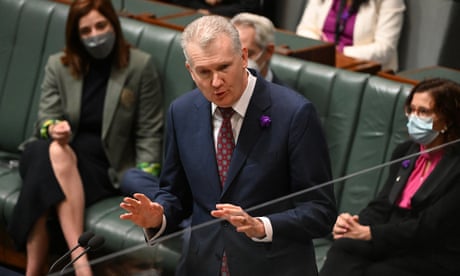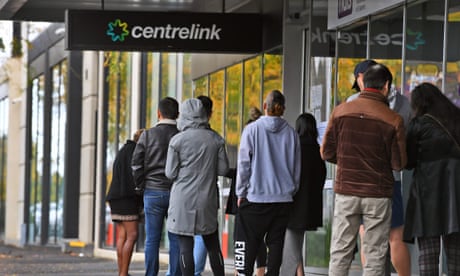Greens, Jacqui Lambie and David Pocock indicate support for abolition but inquiry will hear from affected communities.

Nearly all the crossbench has indicated support for the government’s election commitment, even while flagging concerns about the time available for participants to transition off the card and support for affected communities.
Labor promised to abolish the cashless debit card, an income management tool that quarantines between 30% and 80% of welfare payments, and prevents it being withdrawn as cash or used to pay for alcohol or gambling. The proposal will not affect the basics card, a separate income management tool used by thousands of welfare recipients in the Northern Territory.

The repeal bill passed the House of Representatives on Wednesday, and will be considered by the Senate in September. It was referred to a Senate inquiry, to report by 26 August.
The shadow health minister, Anne Ruston, who is also the manager of opposition business in the Senate, accused Labor of “disrespect” over its urgency in pushing the bill through, calling the repeal an “appalling decision”.
The Greens social services spokesperson, Janet Rice, said her party welcomed the end of the cashless debit card but would use the Senate inquiry to examine the “complicated” process to end the program.
“This inquiry will give the Senate a chance to hear from affected communities, particularly First Nations communities, who are disproportionately impacted,” she told Guardian Australia.
“In the introduction of the cashless debit card, we saw poor consultation by the previous government result in divided communities, where some voices were elevated above others. For this program to end equitably, we cannot allow this to happen again.”
A spokesperson for the Jacqui Lambie Network said its two senators would likely support the government’s bill, but raised concerns about the transition time for people to exit the program.
They also spoke of the impact on affected communities if connected social supports – including employment and substance abuse programs – were to end.
Pocock, referencing scathing reports on the card, said it “clearly isn’t doing what it is meant to do”.
“I support the repeal,” he told a press conference on Thursday.
“It’s ineffective, and in some cases, really damaging. I think there has to be a different approach, working with communities on solutions that actually work.”
The social services minister, Amanda Rishworth, said she expected participants would be able to opt out of the scheme in September.
As of 27 May there were 17,322 participants across trial sites in the Northern Territory, East Kimberley, Ceduna, Bundaberg and Hervey Bay, Cape York and Goldfields regions.
The repeal bill was rushed through the lower house on Wednesday, passing 86-56. The Coalition complained of the accelerated passage of the bill, under new procedural powers the government granted itself last week, with the LNP MP Keith Pitt calling the truncated debate an “attack on democracy”.

The shadow social services minister, Michael Sukkar, claimed the card’s abolition would lead to a “flood of alcohol and drugs” into communities where the card was used.
But Labor was joined by the Greens and most of the crossbench to pass the bill through the lower house.
The One Nation senator Pauline Hanson will oppose the repeal.
“I supported the cashless welfare trials and I support the cashless debit card. I think it needs to be rolled out further,” she said.
“I went and talked to people in Kalgoorlie, where it was trialled. They reported positive outcomes – better nutrition for children, less alcoholism and less alcohol-fuelled violence. I saw this for myself.”
Rishworth has flagged further discussion later this year on income management. Rice said the Greens would push to end all compulsory forms of income management, including the basics card.
“I hope this inquiry will be an opportunity to hear from those that will be forced onto the basics card once the CDC ends, and how our current compulsory income management system is deeply broken and needs to be urgently fixed,” she said.
No comments:
Post a Comment